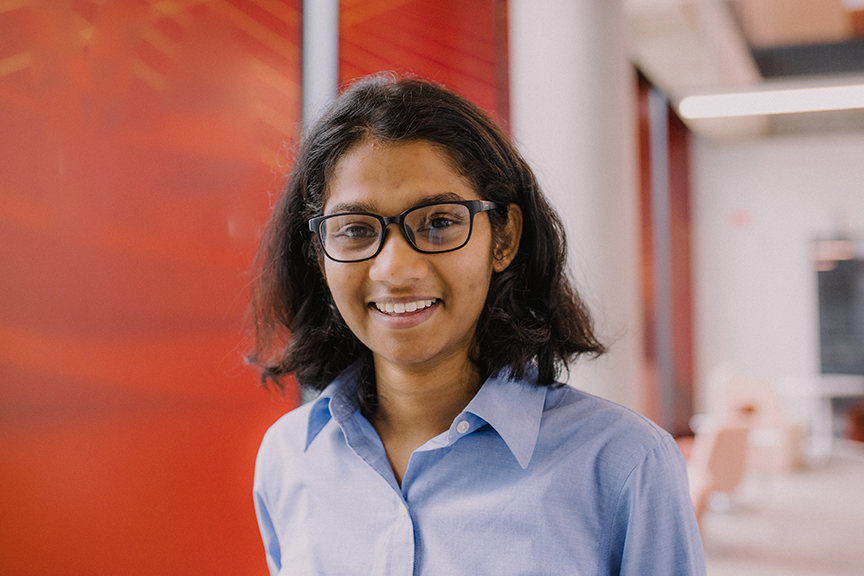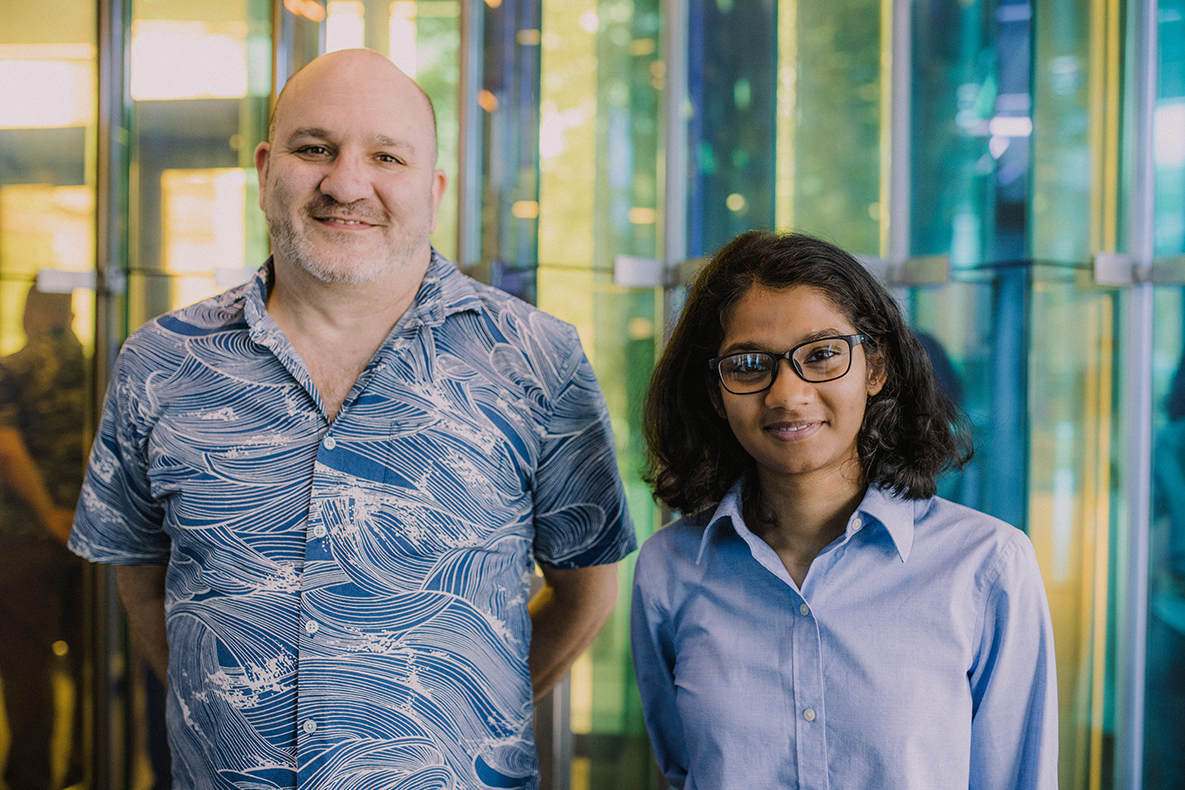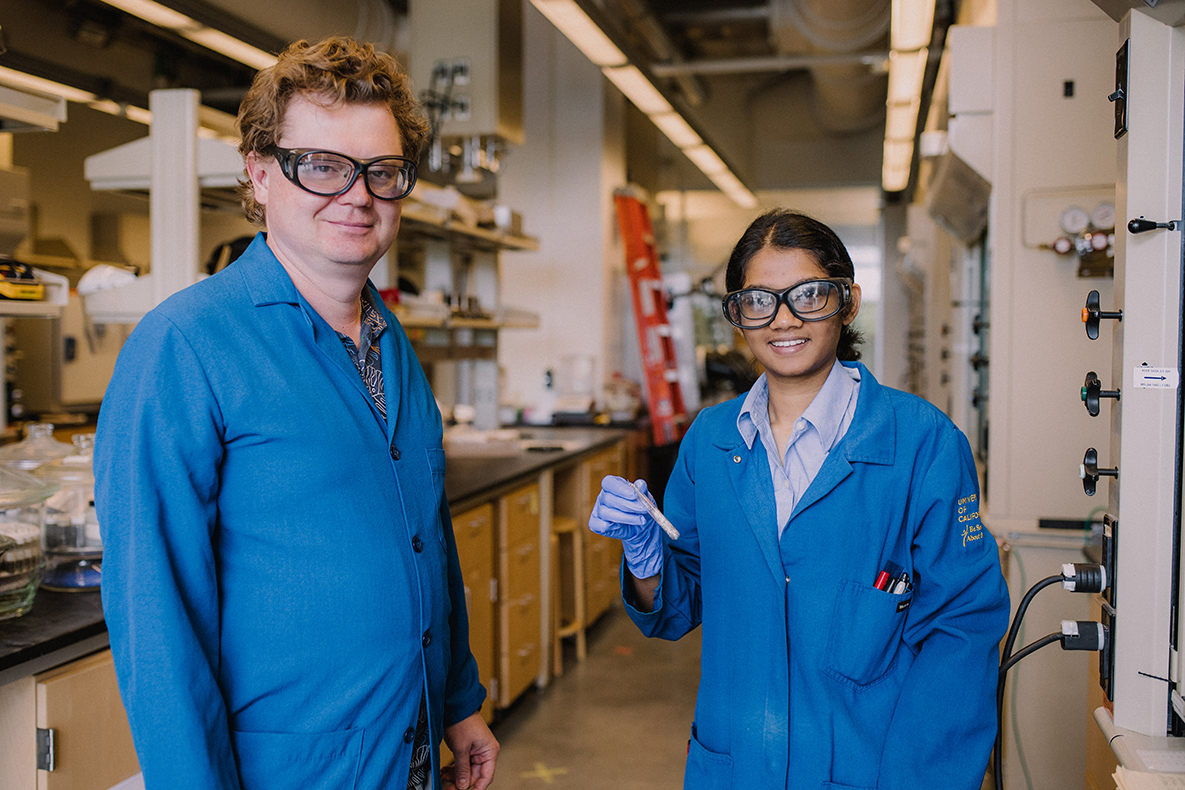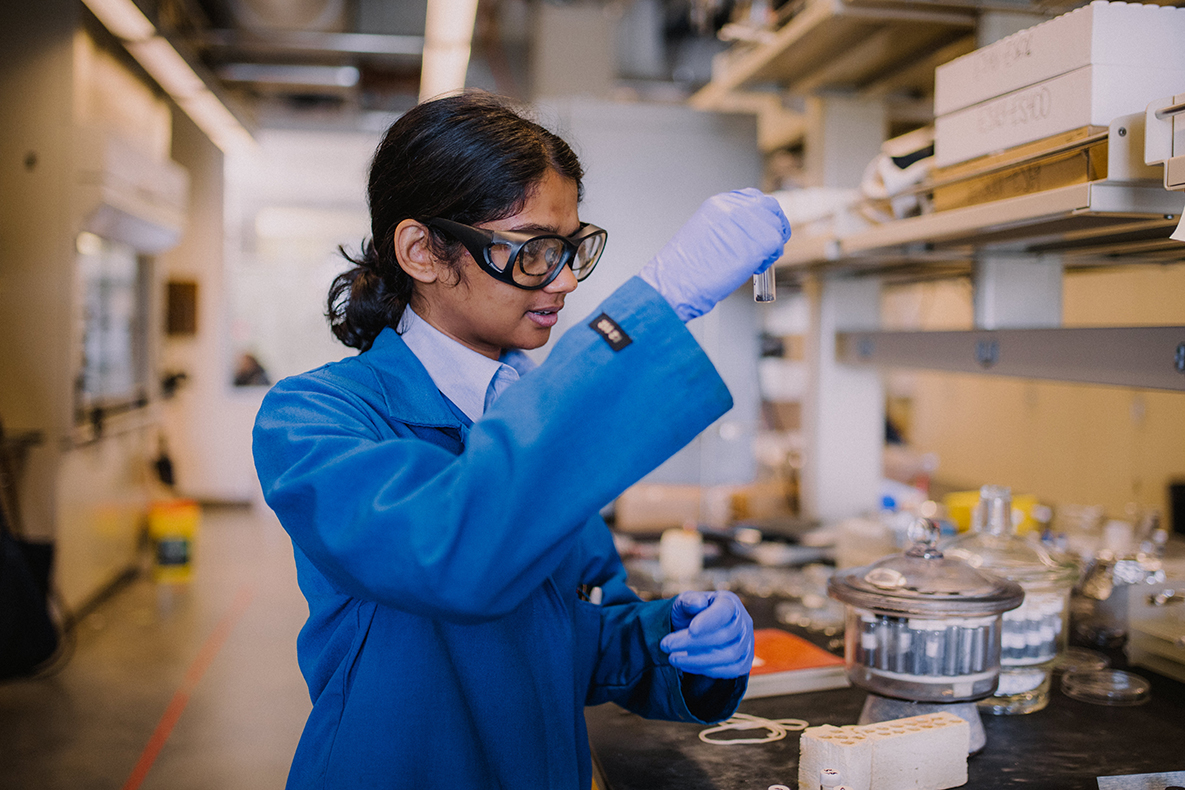Nethmi Hewage (’23 chemistry) was certain of one goal when she arrived at Iowa State University. She would major in chemistry. While growing up in Sri Lanka, Hewage was drawn to science and mathematics. She enjoyed presenting research topics to classmates and serving as president of her high school science society – activities which stirred a fascination with science.
Although her decision to study chemistry was rock-solid, Hewage was like most college freshman. She had plenty of unanswered questions.
“Chemistry is such a broad area and I was unsure about which field of chemistry suited me best and which career I should pursue,” Hewage said. “But I had a big university and a great chemistry department where I could explore and figure out everything – and that’s exactly what I set out to do.”
Earning a Goldwater Scholarship
Hewage’s quest for answers has kept her busy. She’s forged relationships with faculty mentors, conducted high-impact research, presented her findings at national conferences, and published studies in academic journals. To gauge her teaching skills, Hewage served as a supplemental instruction leader for physics students. She also interned in chemistry, engineering, and materials science departments to determine which branch of science might spark a lifelong career.
And along the way, Hewage earned some national attention.
This fall, Hewage began her senior year as a 2022 Goldwater Scholar, the nation's premier undergraduate scholarship program in science, technology, engineering, and mathematics. Only 417 students were selected from a pool of more than 5,000 applications. Students must earn a formal endorsement from their college or university before applying.

“Nethmi winning is a testament to how strong her application was. I would hate to be on that committee choosing who wins, because the Goldwater Scholarship is one of the most prestigious, competitive awards in the nation,” said John Milstead, coordinator of nationally competitive awards at Iowa State University.
A Goldwater Scholarship covers up to $7,500 in annual college expenses.
“I was able to get to this stage because there are so many undergraduate opportunities at Iowa State and everyone – from professors, peer mentors and program managers – is rooting for you to succeed and grow,” Hewage said. “Any student can create their own support team. It’s just a matter of getting involved, exploring, and taking advantage of all that Iowa State has to offer.”
“I had a big university and a great chemistry department where I could explore and figure out everything – and that’s exactly what I set out to do.”
One of the first things Hewage did after arriving on campus was join STEM Scholars, a program that has opened doors for hundreds of Iowa State students.
Empowering students
STEM Scholars is a supportive peer-to-peer network that provides workshops, resource referrals, and personalized career guidance. The program directly addresses the challenges faced by STEM students in traditionally excluded groups, including first-generation students, underrepresented groups, students with disabilities, LGBTQ+ community members, and students from low-income backgrounds.
“We point students toward opportunities all over campus and we show them how to build a community that can help them achieve their academic and career goals,” said Corey Welch, director of the STEM Scholars program. “And Nethmi followed the STEM Scholars model to a T.”
Hewage learned about Research Experiences for Undergraduates (REU) through STEM Scholars. She applied, was accepted, and spent a summer conducting research at the University of Minnesota, Twin Cities, in the Department of Chemical Engineering and Materials Science.

“I went from not knowing what an REU was, to designing and testing ceramic coatings that protect jet engines from sand and dust, which was really cool,” Hewage said. “It was a great experience working on the engineering side of materials science with Dr. David Poerschke, who was a terrific mentor.”
After being bit by the research bug during her freshman year, Hewage has excelled as a student scientist in the Kovnir Lab in the Department of Chemistry on the Iowa State campus.
Success in the Kovnir Lab
“I was very curious about research, so I started studying labs all over campus and reading through their webpages,” Hewage said. “I immediately found Dr. Kovnir’s work fascinating and very different from traditional chemistry, so I reached out and asked him for an opportunity.”
The Kovnir Lab specializes in synthesizing and characterizing materials that can store, convert, and generate energy. Led by Professor Kirill Kovnir, the group’s research is focused on developing novel materials that could be incorporated into a wide range of commercial products – from car engines to computer lasers for telecommunications. The goal is to create fundamental materials that are more energy efficient and leave a smaller carbon footprint.
“Saving energy is an important issue right now and I want to be a part of finding solutions that create clean energy and help the environment.”
Kovnir doesn’t typically hire freshman to work in his lab. But he was impressed with Hewage’s thorough understanding of his research and her earnest interest in the lab’s methods.
“Nethmi was very persistent and I’m glad I gave her a chance, because she’s made meaningful contributions in the lab and has shown a rare dedication to research,” Kovnir said. “She’s now leading independent projects and her name is on several published research papers, which is pretty amazing after learning the basics just a couple of years ago.”
Hewage synthesizes novel compounds using a combination of metals and non-metallic elements, such as sulfur and arsenic. Much of the work involves testing the compounds for thermoelectric properties. Thermoelectrics convert heat that would otherwise be wasted into usable electricity. It’s intricate work that requires a deep understanding of chemistry.
“Through this work, I’ve definitely discovered a passion for creating new materials that can be used to solve the energy crisis,” Hewage said. “Saving energy is an important issue right now and I want to be a part of finding solutions that create clean energy and help the environment.”
The chemistry of great mentors
Hewage plans to earn a Ph.D. in chemistry or materials science and become a faculty researcher with her own lab. She hopes to inspire young researchers, as her mentors in the Kovnir Lab have inspired her.
“I owe a great deal to Shannon Lee (Ph.D. ’21 chemistry) who trained me and gave me a great foundation by teaching me basic lab techniques and skills,” Hewage said. “And Dr. Kovnir has been the major person who helped me figure out my career path and direct me into the materials science field.”

Georgiy Akopov, a Spedding postdoctoral fellow at the Ames National Laboratory, who works closely with the Kovnir Lab, was impressed with Hewage’s skills and knowledge. After Hewage secured a prestigious Science Undergraduate Laboratory Internship (SULI) through the U.S. Department of Energy, Akopov oversaw her progress. He invited Hewage to collaborate on several research projects, synthesizing compounds with non-linear optical and magnetic properties.
“Nethmi is named as second and third author on scientific papers associated with this work,” Akopov said. “She’s invested a great deal of time, worked long hours in the lab, and has made great progress on synthesizing these compounds.”
Hewage’s research has been published in the Journal of Alloys and Compounds, Chemical Science, and the Journal of Inorganic and General Chemistry. She’s currently leading an independent project involving crystal growth and characterization of silver-germanium arsenide.
When the results are published this fall, Hewage will be cited as first author on the study – a significant accomplishment for any seasoned researcher and a rare achievement for an undergraduate.
The domino effect of research
Hewage’s research in the Kovnir Lab has led to additional opportunities. She’s presented her research at national conferences, including Harvard University’s National Collegiate Research Conference, the National Conference on Undergraduate Research, and the Society for Advancement of Chicanos/Hispanics and Native Americans in Science Conference.
“Speaking at conferences has been a great way to share my research with a wider audience and network with researchers from all over the country,” Hewage said. “Through STEM Scholars, I also learned that LAS has a program that pays undergraduates for conducting research.”
The LAS Dean’s High Impact Award for Undergraduate Research allows students to carry out leadership roles on important research with faculty mentors. Students earn up to $1,200 a semester and $4,800 during the summer. Since 2018, nearly 300 students from a variety of LAS majors and departments have earned this award.
Hewage earned two LAS Dean’s High Impact Awards for her research in the Kovnir Lab. These scholarships, as well as scholarships from the Department of Chemistry, allowed her to quit a job in ISU Dining and instead earn money in her field of study.
“This is nothing that I did alone. I worked hard, but I am nothing without my team.”
“LAS Dean’s High Impact Awards for Undergraduate Research are funded by generous alumni donations. The program has made tremendous impacts on student success as they apply for scholarships, graduate programs, and professional schools,” said Kent Kerby, assistant dean for the College of Liberal Arts and Sciences. “Iowa State faculty, staff, administrators, and alumni are invested in helping students succeed. This is truly a team effort that crosses all facets of the college.”
Asked and answered
In August, Hewage began her senior year at Iowa State with solid answers to many of the questions she pondered during her freshman year. She hopes to continue her work as an undergraduate research ambassador, possibly helping new students answer their own important questions.
It’s Hewage’s way of paying it forward and expressing gratitude for the mentors who helped her succeed at Iowa State.
“This is nothing that I did alone,” Hewage said. “I worked hard, but I am nothing without my team – everyone from the Kovnir Lab, Dr. Kerby, Dr. Corey Welch, all of the teaching professors, peer mentors, the TAs, my family, as well as friends in the STEM Scholars program – they all helped me to get to this place.”
